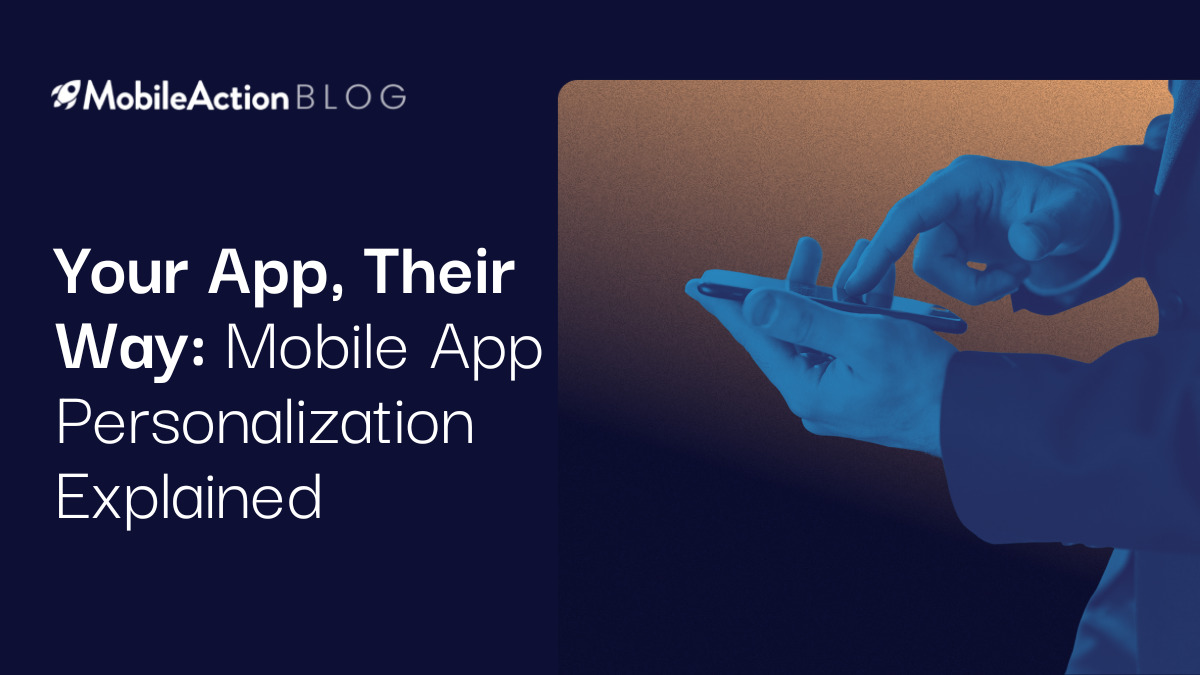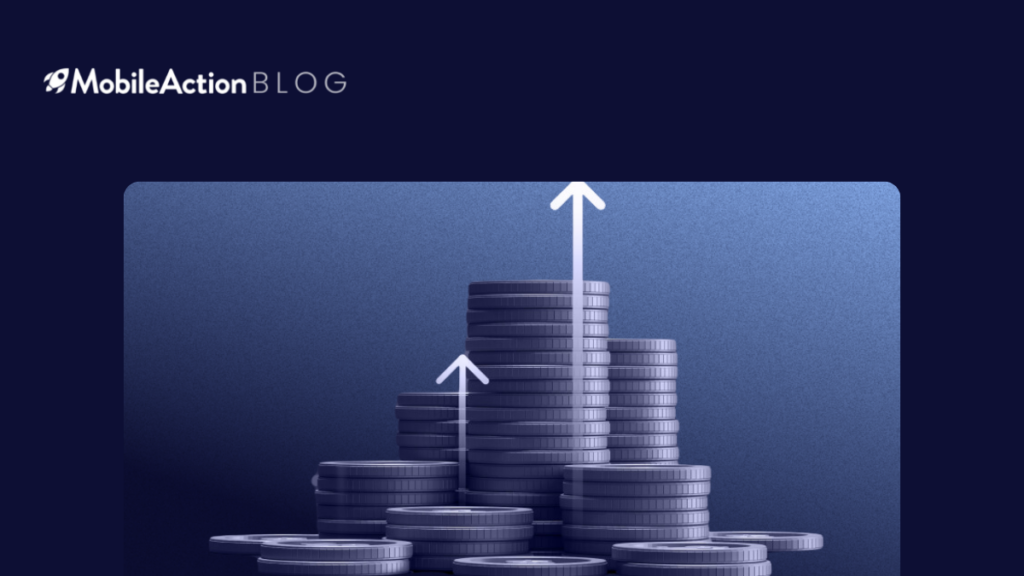Personalization has been a popular marketing trend for some time now, and it is not simply used in emails or on websites. Now it is one of the key elements of the mobile app industry because, when we consider the growth in the mobile app market, it was not unexpected that personalization and mobile apps met at one point. So yes, mobile apps can be customized as well, and they give their users a special experience when they are on the road.
The value that people give to user experience is increasing day by day because it makes the lives of both business owners and customers easier. According to business forecasts, by 2026, the global revenue of customer experience personalization and optimization software is projected to surpass 11.5 billion U.S. dollars. Considering that this number will increase every year, it can be easily said that mobile app personalization has a great impact on both mobile app owners and mobile app users.
In this blog, you are going to discover what mobile app personalization is, the prominence of mobile app personalization, the benefits that mobile app personalization brings, and some real-life examples of mobile app personalization on the most popular mobile apps such as Spotify, TikTok, and Instagram.
What Is Mobile App Personalization?
Mobile app personalization is the process of transforming an application into a form that satisfies the needs, wishes, and expectations of the app users. The goal of mobile app personalization is to enhance app users’ overall satisfaction while they are using the app. Therefore, instead of employing a one-size-fits-all approach, personalized mobile apps target the specific needs of their users.
However, providing a robust mobile app personalization experience requires collecting some data. It is possible to personalize mobile apps only if they collect some relevant data about their users, such as their demographics, locations, interests, etc. By collecting the necessary data, mobile apps can create unique experiences for their users. That could come in different forms, such as push notifications, in-app messages, discounts, offers, and recommendations.
Mobile app personalization is different from customization and should not be confused with it. Personalization, basically, is all about providing a better overall user experience. Customization, on the other hand, refers to the process of changing a good or service in a way to meet the preferences or needs of users. Therefore, the main difference between them is that personalization is an action taken by the app owner, while customization is an action taken by the app user.
Mobile app personalization is just one of the processes that apps can benefit from. Another key factor that can be beneficial to app owners is App Store Optimization. In MobileAction, we provide both customized and personalized solutions to mobile apps to increase their overall visibility and conversions.
To discover more about how our ASO tools boost your app promotion and help your app maximize its visibility and conversion, you can simply schedule a demo. Furthermore, if you want to save time and use your money more efficiently in app promotion processes, you can sign up for free and start unlocking the power of ASO products developed by MobileAction.
Why is Mobile App Personalization Important?
The app space is already very crowded, and the expectations of the users are growing day by day. Similarly, as mentioned in one of our earlier blogs, Uses of AI in Mobile App Industry: Paving the Way for the Future, the mobile app market size is also growing gradually. And again, as mentioned in one of our latest blogs, Mobile App Monetization: Top 13 Ways to Maximize Your Revenue, approximately 95% of the available apps are free.
So, there is no need to say that the competition in the mobile app industry is very tight.
Today, app owners who aim to be successful by getting out of this competition are trying to make a difference by trying mobile app personalization strategies. In this way, they can become a key player in the mobile app market by increasing the user experience to the highest possible level.
As a result, mobile app personalization plays a pivotal role in creating countless benefits for both app owners and users of the apps. As technology continues to advance, the importance of personalization will only grow, making it a crucial aspect for app developers looking to succeed in the dynamic and ever-evolving world of mobile applications.
In this blog, we have compiled some major benefits of mobile app personalization for you. If you are ready, let’s jump into discovering each of them in detail!
Benefits of Mobile App Personalization
Mobile app personalization refers to tailoring the user experience within a mobile app to meet the individual needs and preferences of each user. By doing so, it aims to create a more engaging and relevant experience, leading to several benefits. These benefits are: raising awareness, providing a better overall customer experience, boosting engagement, encouraging in-app purchases, enhancing user retention, and increasing brand loyalty.
Here are the six major purposes that mobile app personalization serves:
Raising Awareness
Personalization can help raise awareness of your mobile app and its features by delivering targeted content to users. When users see content that resonates with their interests and needs, they are more likely to engage with the app and explore its functionalities further. This increased engagement can lead to more word-of-mouth referrals and recommendations, which, in turn, can attract new users to the app.
Providing a Better Overall User Experience
Personalization enhances the overall user experience by offering users content, products, and services that are relevant to them. It eliminates the need for users to sift through irrelevant information, streamlining their interactions with the app. By tailoring the app experience to each user, it becomes more efficient, convenient, and enjoyable, leading to increased satisfaction and loyalty.
Especially in the last two years, Spotify has given extra importance to mobile app personalization. Oskar Stål, Spotify’s Vice President of Personalization, explains this as adding that extra ‘you’ to their users’ experiences.
Spotify users can access many different songs similar to that song by tapping on the “Go to radio” option. Similarly, Spotify users can enjoy a shared and personalized playlist created by Spotify by joining a “Blend” with their friends. All of these features make the app more personalized for users and raise the overall user experience to the highest possible level.
Boosting Engagement
Personalization can significantly boost user engagement with your mobile app. When users receive content that matches their interests, preferences, and behaviors, they are more likely to spend time within the app and interact with different features. Higher engagement levels contribute to increased retention rates, better analytics, and overall app success.
Encouraging In-App Purchases
When users encounter personalized product recommendations, offers, or discounts, they are more likely to make in-app purchases. Personalization allows you to target users with items or services they are likely to be interested in, increasing the chances of conversion. This can have a positive impact on your app’s revenue generation and business growth.
Enhancing User Retention
App personalization plays a crucial role in improving user retention rates. When users feel that the app caters to their unique needs and preferences, they are more likely to continue using it over time. The personalized experience creates a sense of loyalty and commitment, reducing the chances of users abandoning the app.
Running ads is app developers’ nightmare since incorrect implementations may harm their user retention rates. TikTok tackles this problem by employing mobile app personalization. As mentioned on their website, users can review and adjust their ad preferences, which enables TikTok to personalize their ads and keep their user retention rate as high as possible.
In a similar vein but from a different perspective, Spotify maintains high user retention thanks to campaigns such as Spotify Wrapped. Wrapped is a personalized Spotify experience that details everything you listened to and how much you heard throughout the year. Because Spotify has implemented this campaign very well, Wrapped has ceased to be a mobile app personalization method just for user retention and has become the new herald of Christmas.
Increasing Brand Loyalty
By providing a personalized and tailored experience, your mobile app can foster a stronger emotional connection with users. This emotional connection can lead to increased brand loyalty, as users develop trust and affinity for the app and the brand behind it. Loyal users are more likely to become brand advocates, promoting the app through word-of-mouth and recommending it to others.
In summary, mobile app personalization is a powerful strategy that benefits both users and app owners. With these benefits, personalized mobile apps can achieve greater success and long-term sustainability in the competitive mobile app market.
6 Ways to Personalize an App
Achieving mobile app personalization involves implementing various strategies to tailor the user experience to individual preferences and behaviors. These strategies are: collecting only necessary data while respecting user privacy, leveraging push notifications and in-app messaging, segmenting first and marketing second, providing tailored recommendations and incentives, and conducting A/B testing and optimization for the best possible output.
1) Collecting Only Necessary Data (and being mindful of privacy)
Effective personalization begins with data collection, but it’s crucial to gather only the necessary information to personalize the user experience. Collecting excessive or irrelevant data can lead to user discomfort and privacy concerns. Strive to obtain user consent for data collection and be transparent about how the data will be used. Adhering to data privacy regulations and best practices is essential to maintain user trust and confidence.
For instance, Instagram suggests some posts according to the accounts we follow, the photos and videos we like, and our connections. Undoubtedly, Instagram collects data to be able to do that. However, at the same time, Instagram respects what you want to see on your home page to enhance users’ home page experiences.
On the home page of Instagram, users can simply tap the three-dot on top of a suggested post, select the not interested option, and stop seeing these posts either temporarily or permanently. In this way, by employing this kind of mobile app personalization strategy, Instagram finds the perfect balance point where the best possible user experience for the app is provided.
2) Push Notifications and In-App Messaging
Push notifications and in-app messages are powerful tools for personalization. By analyzing user behavior and preferences, you can send targeted notifications that provide valuable information or promote relevant content. For example, you can send reminders for abandoned shopping carts, personalized product recommendations, or updates on content that matches the user’s interests. However, be cautious not to overwhelm users with excessive notifications, as it may lead to them disabling notifications for your app.
3) First Segment, then Market
Segmentation involves dividing your user base into smaller groups based on common characteristics, interests, or behaviors. Before you implement personalization strategies, it’s crucial to first segment your audience effectively. By understanding your users’ needs, you can then tailor your app’s content, offers, and interactions to each segment. This approach ensures that your personalization efforts are relevant and resonate with specific user groups.
4) Tailored Recommendations
Personalized recommendations are a potent tool for enhancing user engagement and driving conversions. By analyzing user behavior, preferences, and past interactions, you can offer tailored product or content recommendations to users. This not only helps users discover relevant content but also increases the likelihood of making in-app purchases or spending more time in the app.
As all mobile apps need to generate revenue in order to survive, improve themselves, and operate better, App Store Optimization becomes a key element in app promotion processes. This makes ASO at least as important as mobile app personalization.
Luckily, MobileAction develops customized and personalized strong ASO tools to help app developers in their app promotion process. For instance, the Keyword Suggestion feature of ASO Intelligence enables you to identify potential ranking chances for your app by looking at the keywords that you could not rank for while your competitors are ranking. The likelihood of your app ranking in the top 10 for those keywords will be shown by comparing it to all of your competitors’ apps.
5) Special Discounts and Offers
Offering personalized discounts and special offers based on user behavior can incentivize users to engage more with your app and make purchases. For instance, you can provide discounts on items that users have shown interest in or offer exclusive deals to long-time loyal customers. Personalized incentives make users feel valued and increase the chances of customer retention.
6) A/B Testing and Optimization
Personalization strategies should be continuously monitored and optimized for effectiveness. A/B testing involves comparing two or more versions of a feature or content to determine which one performs better with users. By conducting A/B tests, you can refine your personalization efforts and ensure that you’re delivering the most effective and engaging experiences to your users.
Taking everything into consideration, by following these practices, app owners can create a more engaging and satisfying experience for their app users, leading to increased retention and loyalty.
Key Takeaways
- Mobile app personalization involves tailoring the user experience to meet the specific needs and preferences of individual users. It requires collecting relevant data about users, such as demographics, locations, and interests.
- Spotify, TikTok, and Instagram are good examples of popular mobile apps that have successfully implemented personalized experiences for their users.
- With the increasing competition in the mobile app industry, personalized experiences are crucial for standing out and attracting users. Personalization can lead to better user engagement, in-app purchases, retention rates, and brand loyalty.
- The major benefits of mobile app personalization include raising awareness, providing a better overall user experience, boosting engagement, encouraging in-app purchases, enhancing user retention, and increasing brand loyalty.
- To achieve effective mobile app personalization, app owners should focus on collecting only necessary data while respecting user privacy, leveraging push notifications and in-app messaging, segmenting the user base, providing tailored recommendations and incentives, and conducting A/B testing and optimization.
- To improve mobile apps’ overall visibility and conversion rates, MobileAction offers individualized and customizable App Store Optimization solutions. With Keyword Suggestion tool, you can beat your competitors at their own game!
- To discover more about MobilAction’s game-changing ASO tools that will take your app promotion processes to the next level, you can schedule a demo today.
- Or if you can’t wait to unlock the powers of these ASO tools, you can sign up for free to go beyond your competition!




